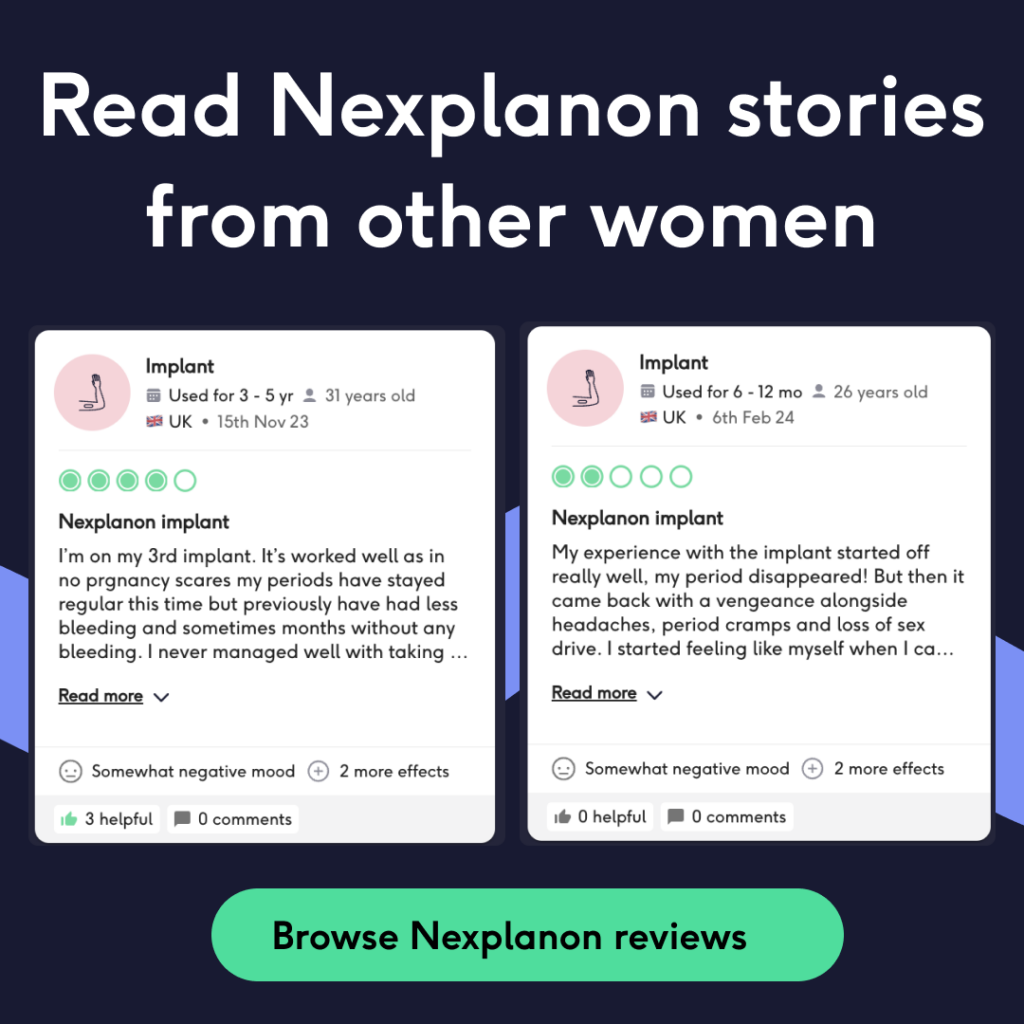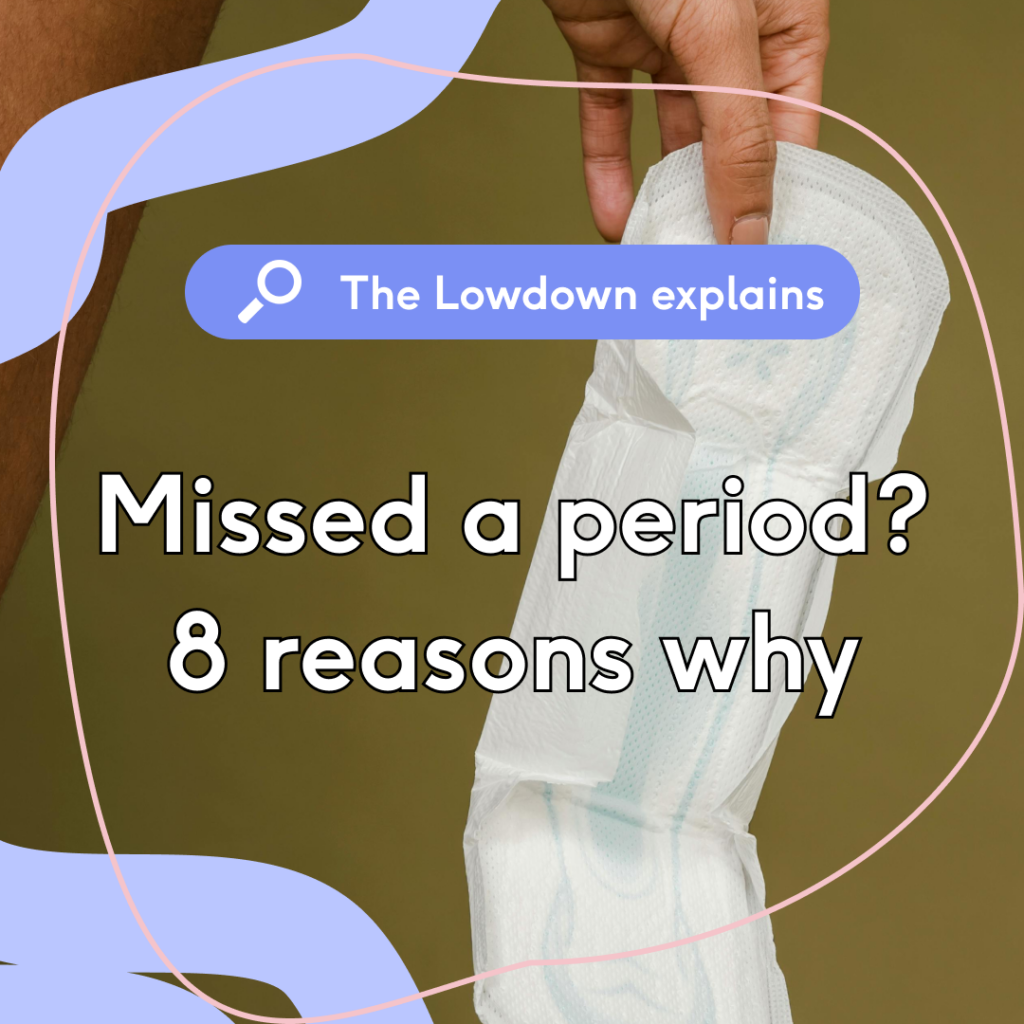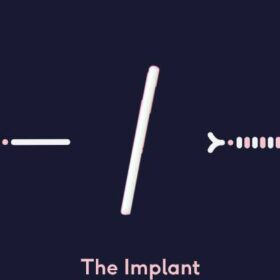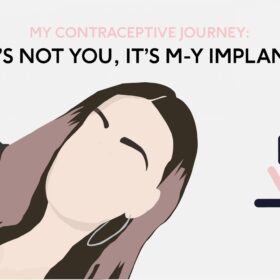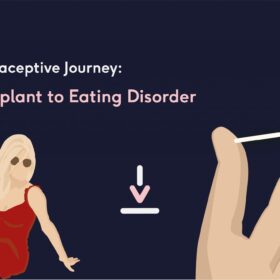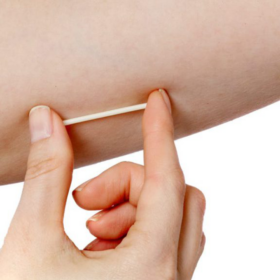
Can you get pregnant on the implant? What happens if it expires?
In this article
What's the lowdown?
The implant (Nexplanon) is more than 99% effective so the chances of getting pregnant with the implant in your arm is fewer than 1 in 100 – those chances increase if it isn’t replaced after 3 years
A common side effect of the implant is lighter, fewer or stopped periods – so if you’re late, it doesn’t mean that you’re pregnant
Certain medications can make the implant less effective, so chat to your doctor if you’re starting a new medication or one of the Lowdown’s team of GPs who specialise in contraception
In the rare case that you do become pregnant with the implant in your arm, talk to a healthcare provider about getting it removed as soon as possible
The contraceptive implant is a method of contraception that stays in the upper arm for three years. It is a good choice for those who don’t want to have to remember to take a daily pill.
How effective is the implant, and can you still get pregnant on the implant?
The implant is more than 99% effective. This means that fewer than 1 in 100 women with the implant will get pregnant each year.
There are some other factors to consider when using the implant as contraception, such as side effects and its use with other medications.
Navigating contraception and pregnancy – whether you’re trying to conceive or avoid it – can be a confusing journey, but it doesn’t have to be! If you‘d like to chat to one of The Lowdown’s doctors about your experience with the implant so far and what the best contraception might be for you, you can book an appointment here.
What is the contraceptive implant?
The implant, also known by the brand name Nexplanon (or previously Implanon), is a small plastic rod that is placed in the upper arm by a doctor or nurse, and is used for contraception, aka birth control.
The plastic device is about the size of a matchstick. The implant is a highly effective method of contraception but can have some side effects which can include changes to your periods, as well as tender breasts and mood swings for example.
How does the implant (Nexplanon) work to prevent pregnancy?
The contraceptive implant works by slowly releasing a hormone called progestogen into your bloodstream which stops you from releasing an egg each month.
It will also thicken the mucus in your cervix, making it much more difficult for sperm to travel through, and also thin the lining of your womb making it harder for a fertilised egg to implant. This makes the implant more than 99% effective.
What does the implant do to periods?
The implant can have an effect on your menstrual cycle. Whilst this isn’t something to worry about, it’s definitely something to consider before choosing this form of contraception.
Many women experience period changes, either becoming lighter, heavier, longer, irregular or stopping completely (also known as amenorrhoea), as shown in our implant reviews. You may also experience spotting whilst on Nexplanon. Check out our blog about spotting whilst on contraception.
When does the contraceptive implant start working to protect against pregnancy?
The implant can be inserted any time during your menstrual cycle. If the implant is inserted at the beginning of your menstrual cycle (the first five days) then you are protected against pregnancy immediately.
If the contraceptive implant is fitted on any other day of your menstrual cycle then you will need to ensure that you use another method of contraception such as condoms for 7 days.
When does the contraceptive implant start working after giving birth?
After giving birth you are able to have the implant fitted any time and it is safe to use if you are breastfeeding. If fitted up to 21 days after giving birth you will be immediately protected against pregnancy. If the implant is fitted after 21 days, you will need to ensure that you use another method of contraception such as condoms for 7 days after the implant is fitted, unless it is in the first 5 days of your period.
Can the contraceptive implant cause infertility?
The implant will not affect a woman’s fertility. As soon as the implant is removed your underlying fertility will return.
Can you get pregnant on the implant?
As this method of contraception is more than 99% effective, it is very rare that you will fall pregnant on the contraceptive implant. As the implant stops ovulation this means that there is also no egg released from the ovaries to fertilise.
You can fall pregnant on the implant if you don’t follow the advice about when it starts working, or if you have had unprotected sex just before you have the implant fitted. In this case, your healthcare professional may offer you emergency contraception.
Can you get pregnant on Nexplanon while on your period?
The same rules apply as above. Whether you are bleeding or not, the implant is still more than 99% effective. So it’s very rare you will get pregnant with Nexplanon in your arm. If you’ve just had your implant fitted and you are in the first 5 days of your period than you are immediately protected from pregnancy. Any later and you will need to use additional birth control for seven days.
What about if I am being prescribed certain medications?
There are certain medications that will make the contraceptive implant less effective. This includes some HIV, epilepsy and tuberculosis medications, St John’s Wort¹ and certain antibiotics such as rifabutinor² and rifampicin³.
We recommend having a conversation with your doctor to ensure that any medication you are taking will not affect the effectiveness of your implant. If your medication does affect this method then we would recommend looking for another method of contraception that isn’t affected by your medication. Unsure which method is right for you? Speak to our friendly doctors at The Lowdown and get personalised contraceptive advice in a one-to-one appointment.
Does taking antibiotics effect the implant’s effectiveness?
Most antibiotics are completely safe to take with the contraceptive implant and will not affect its effectiveness. But there are certain antibiotics such as rifabutin or rifampicin that may make the implant less effective. Ask your doctor or pharmacist for advice about this if you are prescribed new medicines.
Do I need to use condoms if I have Nexplanon?
As Nexplanon is 99% effective, your chances of falling pregnant are very low. However you can still use condoms if you wish. We do recommend that you use condoms to protect yourself from sexually transmitted infections. Nexplanon doesn’t protect you from STDs – only barrier methods (including condoms) offer this.
How long does the implant last and can you get pregnant on an expired Nexplanon / Implanon?
Nexplanon can be used for three years, at which point it should be replaced to maintain its effectiveness. We recommend contacting your GP or sexual health clinic to discuss the replacement of your contraceptive implant prior to the date it is due to be replaced (so keep a diary or reminder).
The implant won’t just stop working early and other than those medicines mentioned above, there isn’t anything else that makes Nexplanon less effective. There is even some evidence to say the implant remains effective (and can therefore stay in) up until four years, which was recommended during the Covid-19 pandemic when access to your GP and sexual health service was limited.
However since November 2021 national guidelines in the UK have again recommended you should attend for your implant removal or replacement at three years. There are no symptoms of it ‘running out’ – any longer than three years and the implant is simply out of date and should no longer be relied on to protect you from unwanted pregnancy.
How will I know if I’m pregnant with the implant in my arm?
On the very rare chance that you may become pregnant on the implant, you may experience signs and symptoms of pregnancy:
- Tiredness
- Nausea
- Headaches
- Tender or sore breasts
- Frequent urination
Looking out for a change in your period is not a good indicator of pregnancy as one of the side effects of Nexplanon is changes in the menstrual cycle. If you are concerned you may be pregnant, we recommend taking a pregnancy test before contacting your GP.
I want to get pregnant but I have the implant – what next?
If you want to get pregnant and therefore no longer need a form of birth control, you should book an appointment with your GP to remove your implant. Actively trying to get pregnant with the implant still in your arm is not recommended as this is very rare and there is also a higher risk of an ectopic pregnancy (see below).
What happens if I get pregnant on the implant?
In the very rare chance you become pregnant whilst using the contraceptive implant then you should contact your doctor. If you become pregnant whilst on Nexplanon, then you have a slightly higher risk of an ectopic pregnancy (a pregnancy in the wrong place).
If you experience unusual vaginal bleeding or lower stomach pain then you must contact your doctor immediately. The Nexplanon implant should be removed if pregnancy occurs, but there is no evidence to suggest falling pregnant whilst using the implant poses any harm to the development of a normal pregnancy.
What are the chances of pregnancy after implant removal?
Like the combined pill and other contraceptive methods, the implant has no impact on your fertility. Once the contraceptive implant is removed, your normal level of fertility will return and you will be at risk of pregnancy.
The only contraceptive that shows a link with a delayed return to fertility after use is the injection – but don’t worry, it’s only short-term. After 2 years there is no significant difference in pregnancy rates when compared with users of non-hormonal contraception. Check our our article on contraception and fertility after stopping.
How long after implant removal will I get my period or be able to get pregnant?
After implant removal your chances of pregnancy will return to what is normal for you, taking into account any changes in medical history and an increase in age – even if you don’t have a period straight away.
It can sometimes take your menstrual cycle a few months to return to normal (within 3 months for the majority of people) however ovulation may still occur (which tends to happen 2 weeks before the start of your period).
So in theory, you could get pregnant after having your implant removed even if you haven’t had a period yet! If you want to get pregnant after having the implant, take a look at our guide about contraception and the return to fertility. And if you would like to learn more about the process of removing the implant, then check out our full guide on contraceptive implant fitting and removal.
If you’re looking for further information on this form of contraception, then our article ‘the contraceptive implant – everything you need to know’ covers fitting and removal plus pros and cons of this method of contraception. Or, speak to one of The Lowdown’s women’s health GPs to discuss everything from contraception to trying to conceive
Our medical review process
This article has been medically reviewed for factual and up to date information by a Lowdown doctor.

